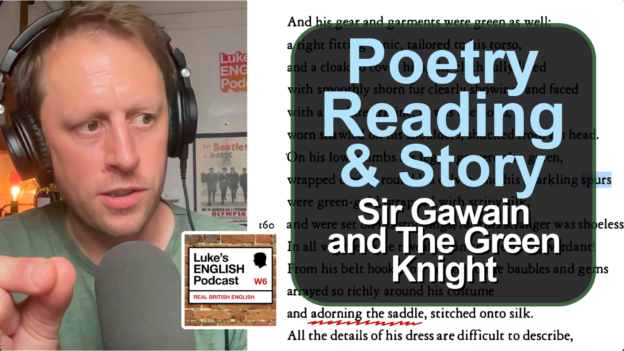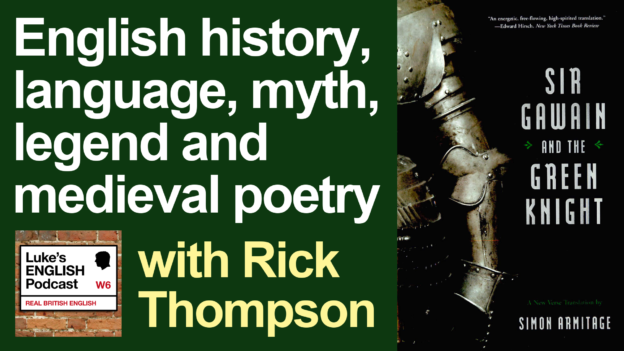Talking to my mum and dad about events in the UK following the death of The Queen on 9 September, including the media coverage, the proclamation of King Charles III, comments about Charles as King and a discussion of the role of the monarch in the UK’s constitution. Also includes some comments about the new Prime Minister Liz Truss and the future of the UK government over the next 18 months.
[DOWNLOAD]
YouTube version (Audio only, but try activating the automatic subtitles)
Introduction & Ending Transcript
Hello listeners,
Welcome back to the podcast. Here is another episode, published only a few days after the last one. As you can see from the title it is another episode talking about the big news of the moment in the UK, the death of The Queen, but also this episode is about the new King, Charles III.
Thank you for the messages which you wrote in the comment section in response to the last episode in which I gave my instant reaction to the news. It is very interesting to read your thoughts, and to see how people have reacted to the news in other parts of the world. There’s been a fairly diverse response but overall most people have expressed their sorrow or their sympathy, with lots of people writing things like “Sorry for your loss” and that’s “loss” not “lost”. Quite a lot of people made that little error. Lost is an adjective and the noun is loss. So, “sorry for your loss”.
As I suggested in the last episode, this one is a conversation with my dad in the form of a Rick Thompson report, but my mum is joining us this time as well. So you’ve got the two of them. Two Thompsons for the price of none. Three in fact including me.
So, if you were wondering what’s been going on in the UK and how it is from the point of view of British people, here we are.
My parents are not flag waving royalists exactly. Long term listeners will probably be aware of their general views on the monarchy. My mum is probably a bit more sceptical about it than my dad, but I think they both think and care deeply about it all and have a critical yet balanced view of the system and the royals as people, overall.
Here is an overview of the things we talk about in this episode.
- What’s been happening since The Queen’s death – descriptions of the media coverage.
Vocabulary → Two words: coverage and footage
Coverage
The broadcasts in the media covering an event or series of events. Coverage means how a story is covered by the media.
Footage
This is video of something, for example footage of William, Kate, Harry and Meghan meeting the crowds of people outside Windsor Castle. If someone takes a video of that on their phone or something, they then have some footage in their phone. If it’s filmed with a camera, then the footage is probably on an SD card and can be put into a news report, uploaded, broadcasted on TV as part of the coverage.
Footage – actually refers to “rolls” or “lengths” of video tape, measured traditionally in feet (12 inches or 30 centimetres). Nowadays it’s all digital of course and not measured by length, but it’s still called footage.
Coverage – the way in which events are covered with all the news programmes and news reports of the event – this is media coverage and it includes the broadcasting of footage with commentary etc.
- Why people say The Queen was extraordinary and that her 70-year reign was so significant
- Details of the ascension of Charles to the throne, to become King Charles III.
- How this was officially pronounced as part of a ceremonial “proclamation” – a sort of traditional ceremony which took place in London over the weekend in which Charles signed legal papers and the news was announced to important people in the government. It was all filmed and broadcast on television for the first time in history. Charles had to sign official documents stating that he was willing and able to take on the role – all part of the legal and constitutional process.
- Mum’s observations of how Charles handled the pressure of this momentous occasion, especially certain moments when he had to sign some papers and he didn’t quite have enough room on the table to do it, which must have been a very stressful moment for him.
- How they feel about Charles and if he will be a good king, plus the challenge he has ahead of him, following in the footsteps of his mother, who was such a successful monarch.
- This leads to a sort of debate or at least an exchange about the nature of that challenge and what it really means to be a successful king or queen in the UK, and the personal sacrifices which must be made in order to fulfil the duty of the role, and how this fits into the democratic process.
- We also talk a bit about Charles’ health and some of the images going around the internet of his swollen fingers, and what might be causing that. It’s just speculation really and we are not doctors of course.
- We do turn our attention away from the monarchy and towards the government nearer the end of the conversation, and the new Prime Minister Liz Truss who replaced Boris Johnson very recently, and what they’re all actually doing, the cost of living crisis in the UK and what the future might be for Liz Truss and for the government over the next 18 months.
As I ever I hope you find this useful as a way of finding out what’s going on in the UK at this moment in time, and also as a way of practising your listening in English and as a way to notice and pick up bits of English as it is spoken.
One thing – I had the wrong microphone selected in my recording software during this conversation, which is a bit annoying, so without realising it I was recording myself using the inbuilt microphone on my laptop, so the sound quality isn’t up to the same standard as usual. My voice is a bit muffled basically, but it should be ok.
Right, without further ado, let’s get started.
Ending Transcript
So that was the Rick and Gill Thompson report. I hope you found that interesting and useful.
Overall I think that the effect on the country of The Queen’s death has not been quite as profound as I predicted in previous episodes. I think I said I thought that the entire country would stop and that everything would be cancelled. Of course it means different things to different people and a lot of people will be very affected by it, but as far as I can tell to a large extent things are pretty much carrying on as normal this week except that the story is definitely dominating the news on TV. Over the weekend it was pretty much around the clock coverage of everything relating to the event and we’ve all been getting lots of notifications on our phones of news stories about it. But people are largely getting on with normal life and work and people aren’t mentioning it in their work emails and everything. Anyway, that’s just how I see it from my position.
As always, leave your comments in the comment section. I am always curious to know what you are thinking as you listen to this.
To end the episode here I thought I would play you the audio from King Charles’s video message to the nation, which was published by Buckingham Palace on Friday, the day after it was announced that The Queen had died. I was going to play just the second half of this, where he gives his promise to uphold his constitutional duty and then describes the new roles and duties of the other members of the family. I was going to play just that part, but in fact I’ve decided just to play you the whole thing. So this is 9 minutes of King Charles III addressing the nation, expressing grief at the passing of The Queen and the promising to fulfil his duties as the king.
This is a chance for you to listen to his statement, but also to notice how he does it. Pay attention to his accent, his choice of words and structures, the way he delivers it all and also the more emotional and personal tone which he uses, especially nearer the end of the message.
I’ll also put this video on the page for this episode on my website and you can activate subtitles on that by the way.
So this is King Charles III addressing the nation in a recorded message published on Friday 9 September.
That was King Charles III.
What’s next for the podcast?
I think I won’t publish more episodes about this now for a while, unless I manage to record interviews with people in London when I am there at the weekend. But we’ll see. I don’t want to do too much on this subject. Probably these two episodes are enough. But as I said, if I end up interviewing some local people on Saturday or Sunday, then I will probably publish that, but we’ll see. I don’t want to overdo it.
The official period of national mourning last until The Queen’s funeral which is on 19 September. I think I will wait until then before publishing any more content. That’s about a week away anyway so it’s the usual period between episodes.
So, I will speak to you again in about a week.
About my choice for what to publish next, I think that I don’t need to be too precious about it and I reckon I will probably publish those episodes I did with James, with a little disclaimer at the start stating that they were recorded before The Queen passed away, and any references to her were not meant to be disrespectful, and I hope people don’t take offence or consider the general tone of the episode to be disrespectful at all. Apparently The Queen had a good sense of humour anyway.
All right. Thank you for listening. Thank you to my parents for their contribution this time.
Do take care, and I will speak to you again in about a week.
But for now, good bye bye bye









